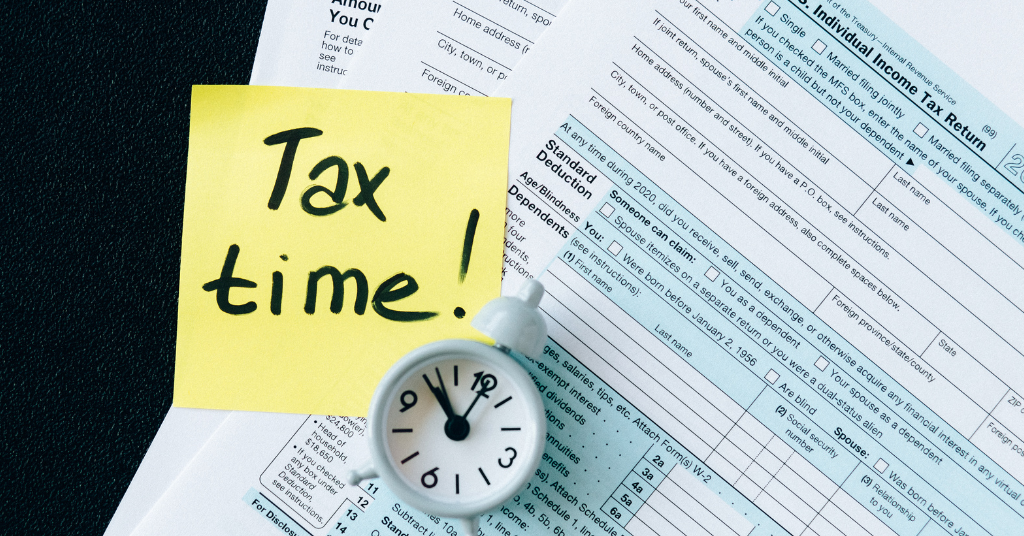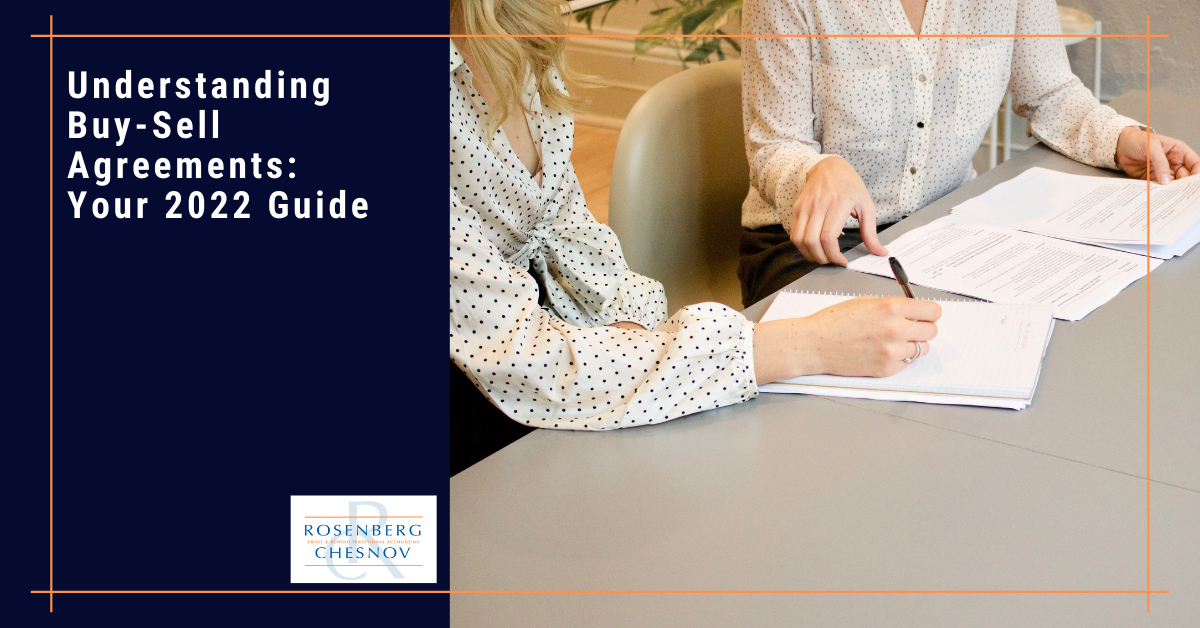

Maximize Your 2024 Refund: Tax Breaks You Might Be Missing
Category: Accounting
Does your business involve co-ownership, partnership, multiple stakeholders, ownership with a spouse, or family ownership?
Alternately, do you hope to pass your business on to an heir one day?
Suppose any of the above applies to you, and you do not have a buy-sell agreement in place. In that case, you are neglecting a vital aspect of your business planning—and no matter how optimistic you may feel now, you are unnecessarily jeopardizing the most significant asset on your balance sheet: your business itself.
A buy-sell agreement is something that many new business owners overlook. Yet, it is an important and practical way for owners or stakeholders to safeguard the company, shareholders, employees, customers, and themselves against serious problems in the future.
Think of it as a business prenup; it can feel unpleasant and awkward to address the potential for circumstances that you hope will never occur. Still, should a challenging split-up come to pass, all parties involved will be glad to have planned for the situation in advance before things got ugly.
Furthermore, a buy-sell agreement isn’t just for unpleasant business divorces. In fact, they are often part of a succession plan to protect the financial interests of the owners of closely held companies and their heirs and protect the company’s stability in case of a major event.
There are plenty of good reasons to have a buy-sell agreement in place for your business, so let’s look deeper into the subject to help you understand:


Essentially, a buy-sell agreement also called a buyout agreement or shareholder agreement, is a legally binding contract between a business and its owners that stipulates what will happen if an owner wants or needs to sell their part of the company.
This also includes what happens to their part of the company if an owner dies, becomes disabled, retires, declares bankruptcy, or gets divorced. The agreement outlines when an owner can sell their interest, who can buy it, and what the price will be.
A good buy-sell agreement should include the following:
Other critical elements of a strong agreement include taxation considerations and funding resources. Finally, the valuation of a company can change significantly in a relatively short time, so the buy-sell agreement should be flexible in its ability to reflect changes in value accurately.
There are several types of buy-sell agreements, including:
Funding for buy-sell agreements is frequently arranged using insurance policies under a cross-purchase agreement or a stock redemption agreement. These are also the most common types of buy-sell agreements.
There are advantages and disadvantages to each approach (see below).
| Advantages | Disadvantages |
|---|---|
| Life insurance proceeds are not taxable to the beneficiary, and the decedent’s estate gets a stepped-up basis in the ownership interest. The transaction does not result in tax liability for either party. | Because older owners’ life insurance premiums will be higher, a disparity in cost is created between older and younger owners. |
| The transactions occur outside the company. The life insurance proceeds are not subject to claims of the company’s creditors. | The agreements must bind the beneficiaries to the agreed-upon transactions, such as selling the deceased owner’s interest. |
| The FMV of the interest acquired increases the basis of the remaining owners. | Control can shift when ownership transfers occur under a cross-purchase agreement. |
| Advantages | Disadvantages |
|---|---|
| Simple to administer with fewer policies required than with a cross-purchase agreement. | For a C corporation, insurance proceeds increase earnings and profits (E&P), resulting in taxation upon distribution to shareholders. |
| The cost of policies is split evenly among owners. | Rules about stock redemptions can be complex. Related-party rules can cause unintended consequences. |
| For a C corporation, the proceeds are not taxable income. | The remaining owners do not benefit from a step-up of basis. |
| Policies are not subject to the claims of the owner’s creditors. | Those with the highest shares of ownership pay the most for premiums. |
A buy-sell agreement is complex, important, and not something you should attempt to draft yourself.
It’s crucial that you seek the assistance of sound and trusted contract lawyers to draft the document. They will work with all parties in drafting, negotiating, and executing the terms of the agreement. It is also a good idea for each party to retain their own counsel during this period.
There are some steps you can take to make the process of setting up a buy-sell agreement smoother. For example, include a valuation clause, which will determine how the value of a stake in the company will be calculated upon a triggering event. You may want to consider including your business’s own valuation methodology in the agreement itself.
Additionally, it’s critical that you pay attention to the tax implications. Again, an honest, conservative valuation methodology can be helpful here to reduce avoidable tax liability in the event of a sale.
Finally, it’s usually a good idea for all partners to take out life insurance policies against each other. This provides the means for a partner to access money to buy out a co-owner in the event of death or disability.
Failing to invest in the services of a contract lawyer in drafting a buy-sell agreement is one of the biggest mistakes you can make (aside from failing to have an agreement in the first place). However, there are other potential pitfalls you should be aware of. Such as…
While these are not the only mistakes that could cause costly issues with your buy-sell agreement, they are three of the most common. Be on the lookout to avoid making the mistake of…
No matter much work you put into perfecting the terms of your buy-sell agreement, it won’t be of much help if the agreement itself doesn’t cover the event that triggers the agreement. Failing to address the trigger event specifically will leave you and the other owners with a time-consuming and challenging negotiation—precisely what the agreement should help you avoid!
At the least, your agreement should cover these seven key areas: death, disability, divorce, voluntary separation, involuntary separation, bankruptcy, and retirement.
If other circumstances apply to your particular business, make sure you take those under consideration, as well.
As touched on above, specificity in the valuation can be beneficial in a host of scenarios. Overall, however, agreeing on how much the business is worth is one of the biggest hurdles you’ll face in your transaction unless you have anticipated it in your buy-sell agreement.
It’s not enough to refer to a “stated value” or promise to hire the world’s best valuation analysts when the time comes. Your agreement should formalize a methodology, formula, or process for valuation. For example, one common approach is to establish proactive valuation regularly.
An effective buy-sell agreement is carefully and thoughtfully customized for the unique characteristics of your business. Too many business owners are content to find a simple template online and fill in the blanks. Unfortunately, that is just not going to be effective.
The best buy-sell agreements are the products of time, consideration, collaboration, and professional legal counsel and are specific, comprehensive, and accurate.
If you are a client and would like to book a consultation, call us at +1 (212) 382-3939 or contact us here to set up a time.
If you aren’t a client, why not? We can take care of your accounting, bookkeeping, tax, and CFO needs so that you don’t have to worry about any of them. Interested? Contact us here to set up a no-obligation consultation.
Interested in receiving updates in your mailbox? Check out our newsletter, full of information you can use. It comes out once every two weeks, and you can register for it below.


Category: Accounting


Category: Accounting


Category: Accounting
Send us a message and we will contact you as soon as possible.
Send us a message and we will contact you as soon as possible.
Jeff Coyle, CPA, Partner of Rosenberg Chesnov, has been with the firm since 2015. He joined the firm after 20 years of business and accounting experience where he learned the value of accurate reporting, using financial information as a basis for good business decisions and the importance of accounting for management.
He is a diligent financial professional, able to manage the details and turn them into relevant business leading information. He has a strong financial background in construction, technology, consulting services and risk management. He also knows what it takes to create organizations having built teams, grown companies and designed processes for financial analysis and reporting.
His business experience includes:
Creating and preparing financial reporting, budgeting and forecasting.
Planning and preparation of GAAP and other basis financial statements.
Providing insight on financial results and providing advice based on those results.
Jeff also has a long history of helping individuals manage their taxes and plan their finances including:
Income tax planning and strategy.
Filing quarterly and annual taxes.
Audit support.
General financial and planning advice.
Prior to joining the firm in 2015, Jeff was in the private sector where he held senior financial and management positions including Controller and Chief Financial Officer. He has experience across industries, including construction, technology and professional services which gives him a deep understanding of business.
Jeff graduated from Montclair State University, he is a CPA and member of the American Institute of Certified Public Accountants, New York State Society of Certified Public Accountants and New Jersey State Society of Public Accountants.
Jody H. Chesnov, CPA, Managing Partner of Rosenberg Chesnov, has been with the firm since 2004. After a career of public accounting and general management, Jody knows the value of good financials. Clarity, decision making, and strategy all start with the facts – Jody has been revealing the facts and turning them into good business results for more than three decades.
He takes a pragmatic approach to accounting, finance and business. His work has supported many companies on their path to growth, including helping them find investors, manage scaling and overcome hurdles. His experience and passion for business reach beyond accounting and he helps businesses focus on what the numbers mean organizationally, operationally and financially.
He has a particular expertise in early-stage growth companies. His strengths lie in cutting through the noise to come up with useful, out of the box, solutions that support clients in building their businesses and realizing their larger visions.
Prior to joining the firm in 2004, Jody was in the private sector where he held senior financial and management positions including General Manager, Chief Financial Officer and Controller. He has experience across industries, which gives him a deep understanding of business.
Jody graduated with a BBA in Accounting from Baruch College, he is a CPA and member of the American Institute of Certified Public Accountants and New York State Society of Certified Public Accountants.
In addition to delivering above and beyond accounting results, Jody is a member of the NYSCPA’s Emerging Tech Entrepreneurial Committee (ETEC), Private Equity and Venture Capital Committee and Family Office Committee.
He is an angel investor through the Westchester Angels, and has served as an advisor for many startup companies and as a mentor through the Founders Institute.